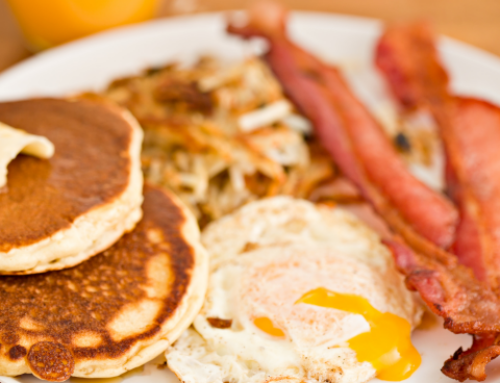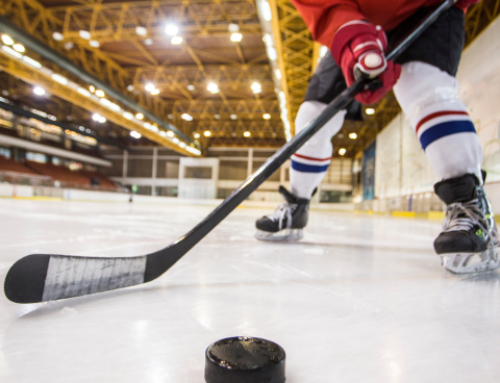Is Your Morning Workout Doing More Harm Than Good?
Do you zip off to the gym in the morning without grabbing breakfast? If so, you might be sabotaging your workout before you even step in the gym.
Building strength requires energy. When you sleep, your body uses stored glycogen (simply put, stored carbs) in your muscles and liver to keep your heart beating and your other organs functioning properly. When you wake up, your brain, muscles and organs need to replenish those depleted glycogen stores.
RELATED: The Easiest Oatmeal Recipes An Athlete Can Make
When your glycogen stores run low, your physical output (your energy level) is reduced to support the conversion of fat and muscle (made of proteins) to energy you can use to power your body. Unfortunately, fat and protein are not mobilized and oxidized quickly enough to meet the needs of the intense muscular contractions that occur during heavy workouts and sports activity. Unless you refuel after a night’s rest, your body remains in an energy-depleted state, which leads to a poor performance in the weight room or on the field.
It would likely take a few days for your body to actually enter a critical starvation state, where all glycogen stores are used up and significant lean muscle mass is broken down for energy. Studies do show, however, that an overnight fast is long enough to more than double nitrogen losses (a byproduct of protein breakdown) when training in a fasting state compared to athletes who eat breakfast first. Basically, if you perform a morning workout on an empty stomach, you’re likely to burn more than twice as much muscle for energy as your teammate who fuels up. That’s the exact opposite of what you’re trying to do in your training!
RELATED: Get More Explosive Off the Line
Another study followed a group of cyclists, half of whom chose to eat breakfast before training and half who did not. Those who did not eat breakfast burned 10 percent more calories from protein (muscle) than those who ate prior to their morning workout. The bottom line: for the sake of preserving lean muscle mass and increasing the intensity of your workout, you must eat something before you exercise.
RELATED: Portable Pre-Training Snacks For Athletes
If you have less than 30 minutes before your workout, consume a small snack. Target carbohydrates and a small amount of protein to provide quick energy. Avoid high-fat foods that could slow down digestion and upset your stomach during exercise. Here are a few easy options you can grab when you wake up:
- Single serving of low-fat Greek yogurt topped with berries
- 8 ounces low-fat chocolate milk
- 1/4 cup dried fruit and 1 oz. low-fat cheese
- 1 English muffin with 1 egg
- ½ cup oatmeal with milk and 2 tbsp. raisins
RECOMMENDED FOR YOU
MOST POPULAR
Is Your Morning Workout Doing More Harm Than Good?
Do you zip off to the gym in the morning without grabbing breakfast? If so, you might be sabotaging your workout before you even step in the gym.
Building strength requires energy. When you sleep, your body uses stored glycogen (simply put, stored carbs) in your muscles and liver to keep your heart beating and your other organs functioning properly. When you wake up, your brain, muscles and organs need to replenish those depleted glycogen stores.
RELATED: The Easiest Oatmeal Recipes An Athlete Can Make
When your glycogen stores run low, your physical output (your energy level) is reduced to support the conversion of fat and muscle (made of proteins) to energy you can use to power your body. Unfortunately, fat and protein are not mobilized and oxidized quickly enough to meet the needs of the intense muscular contractions that occur during heavy workouts and sports activity. Unless you refuel after a night’s rest, your body remains in an energy-depleted state, which leads to a poor performance in the weight room or on the field.
It would likely take a few days for your body to actually enter a critical starvation state, where all glycogen stores are used up and significant lean muscle mass is broken down for energy. Studies do show, however, that an overnight fast is long enough to more than double nitrogen losses (a byproduct of protein breakdown) when training in a fasting state compared to athletes who eat breakfast first. Basically, if you perform a morning workout on an empty stomach, you’re likely to burn more than twice as much muscle for energy as your teammate who fuels up. That’s the exact opposite of what you’re trying to do in your training!
RELATED: Get More Explosive Off the Line
Another study followed a group of cyclists, half of whom chose to eat breakfast before training and half who did not. Those who did not eat breakfast burned 10 percent more calories from protein (muscle) than those who ate prior to their morning workout. The bottom line: for the sake of preserving lean muscle mass and increasing the intensity of your workout, you must eat something before you exercise.
RELATED: Portable Pre-Training Snacks For Athletes
If you have less than 30 minutes before your workout, consume a small snack. Target carbohydrates and a small amount of protein to provide quick energy. Avoid high-fat foods that could slow down digestion and upset your stomach during exercise. Here are a few easy options you can grab when you wake up:
- Single serving of low-fat Greek yogurt topped with berries
- 8 ounces low-fat chocolate milk
- 1/4 cup dried fruit and 1 oz. low-fat cheese
- 1 English muffin with 1 egg
- ½ cup oatmeal with milk and 2 tbsp. raisins











